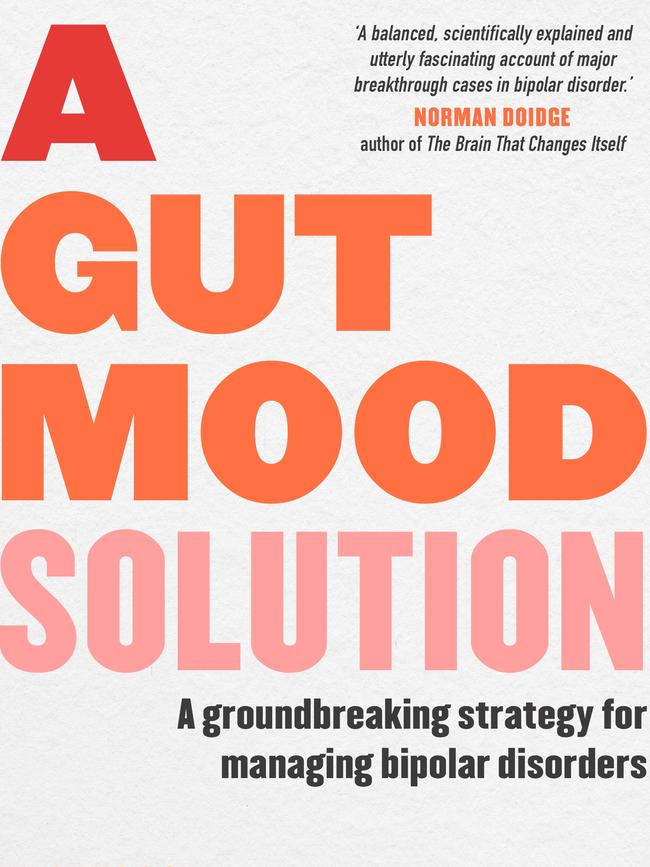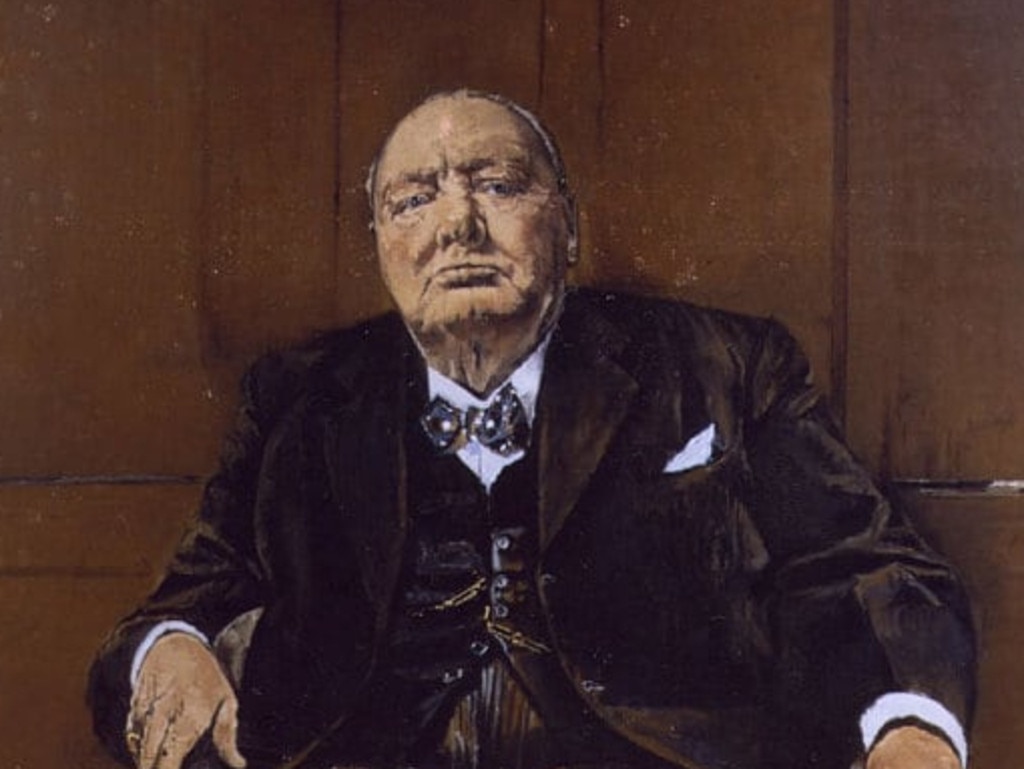It sounds disgusting, but this radical experiment cured Jane’s bipolar
Medicos examining the link between our guts and our brains say if mental health illnesses can be treated and cured via ‘poo transplants’ then neurogenerative diseases could too.

In an arid backyard after nightfall in a tiny village in northern NSW, Jane Dudley was standing stock-still on a patch of prickly khaki-burr leaves and bindi-eyes. The weeds pierced the soles of her feet but she felt nothing as she stared into the middle distance. Reality had long since departed, and as her partner Alex rushed to her side after an anxious seven-hour drive he recognised immediately that the 32-year-old was in a catatonic state.
“It was really strange to find Jane in the middle of the backyard, burrs and spines embedded in the soles of her feet,” he says of that experience eight years ago. “She was looking right through me, as if I wasn’t there. I understood everything in that moment. I knew she was broken. I wanted to fix her.”
Jane had bipolar disorder, which sent her catapulting into periods of mania and psychosis. The rest of the time, she suffered depression so severe it defied description. “How do you describe hell?” was her response to psychiatrist Gordon Parker when recounting the terror of her inner world. “I felt trapped within my broken mind. I was lost in a realm of infinite suffering and torture, with no light or hope to grasp onto. I was misery personified. Death felt like the only escape.”
After developing severe depression as an adolescent, and later intractable Bipolar 1 disorder, Jane had been hospitalised 12 times from the age of 29, frequently spending weeks in involuntary psychiatric wards. She had attempted suicide multiple times, and simply no longer wanted to live. Like so many people suffering severe mental illness, modern medicine had little to offer her. Anti-psychotic medication had left her obese. Her condition was treatment-resistant. “I had barely survived 18 years of hell,” she says. “The realisation that I might face another 50 years of it terrified me.”
Desperation is a powerful motivating force. But so is love. And sometimes, blue-sky medical advances that change the world have their origins not in the laboratory but in the heart.
“When I met Jane it wasn’t like falling in love,” says Alex, a wildlife surveyor, parks ranger and author of a book of poems and photography about wildlife. “It was like we’d always known each other. I just totally understood the suffering that Jane was going through. I realised exactly why she wanted to take her life, and I was horrified by that.
“Here I am, an unqualified bush poet in the middle of nowhere, but I’ve always been interested in science. I’d read about the microbiome and faecal transplants being able to transfer obesity. I never dreamed such a process could cure bipolar.”

A massive amount of scientific research into the gut microbiome – the ecosystem of bacteria, fungi, viruses and other microbes that live in our intestines – has taken place in the past decade. The gut, which is lined with more than 100 million nerve cells, is increasingly understood to encase the body’s “second brain”, playing an important role in regulating crucial brain hormones and neurotransmitters.
Although links between the microbiome and depression are now well established, few scientists dreamed that a poo transplant might be completely curative of bipolar disorder. But that’s exactly what Jane and Alex appear to have established in their tiny town of Coolatai, when Alex, after carefully reading the scientific literature, offered to be a faecal donor for his wife. One spring day in 2016, the pair set up a kitchen blender, mixed up a saline solution and whizzed Alex’s poo to a brown slush. They strained the mixture through a cooking sieve and fed it into a home enema kit in order to repopulate Jane’s microbiome with Alex’s unique mix of bacteria, fungi and viruses.
“There was no precedent for what we did,” Jane says. “We didn’t know how many transplants to do. We didn’t know how frequently to do it. So we basically did one every two weeks.”
The couple stress that they would never advise anyone else to perform a DIY poo transplant. The procedure is associated with a small degree of risk – pathogens and serious diseases can be transferred from one party to another. In clinics, faecal microbiota transplant (FMT) donors are carefully screened, in particular for communicable diseases; performing the procedure at home lacks these safeguards.
But for Alex and Jane, the procedure led to something remarkable. “In March 2017 I started to experience a progressive reduction in my depressive symptoms,” Jane says. “It was just like my depression got less and less and less. Then there was a day, and I’ll remember this day forever, when I woke up and I was confused – ‘What is this strange feeling? Do I feel good?’ It was a feeling I’d never felt in my adult life, because I always had some level of depression. It was the day the depression stopped, and from that day on I started to feel good, I started to have feelings of motivation and self-worth, and just this background feeling of joy to be alive.”
No clinical trials have yet been published onFMT and bipolar or depression. But in late 2023 Jane Dudley called Professor Gordon Parker, founder of the Black Dog Institute and scientia professor of psychiatry at the University of New South Wales, and recounted her story in the hope that it might help other sufferers like herself. Parker felt his hair stand on end. “I had never heard a story like that in my life, ever, so it had a ‘wow’ response in me,” he says. “I was absolutely flabbergasted. And even though I of course thought, ‘Could this be a placebo?’, you just don’t get placebo responses like that for bipolar.”
Parker has been treating patients with bipolar for more than 40 years and is a renowned expert in managing the condition. “I’ve obviously been around a long time,” he says. “I’ve seen so many scenarios. I have heard great stories of wonderful advances in medicine. This one blew me away. It was exceptional.”
Jane’s entreaty to Parker was simple: one case study was not enough; there should be a clinical trial. He agreed wholeheartedly, but first he set about empirically ruling out all other possibilities for Jane’s remarkable recovery. He spoke to her psychiatrist. He analysed Jane’s case every which way. Had her manic episodes been associated with drugs? Were there any alternative explanations for her recovery? What did the leading gastroenterologists studying gut health think of the theory that a poo transplant could cure bipolar?
“I judged that it stood up,” Parker says. “After carefully ruling out all other possibilities, I deemed she was telling the truth.”
Parker has now written a book, titled A Gut Mood Solution, in which he delves into the science of the microbiome and its links with mental illness. He presents five case studies in addition to Jane’s; one of them, a man named Tony, was his patient. Two of those case studies experienced remission of their bipolar symptoms, and the other three experienced a positive response but a return of symptoms after scaling down their medication. Jane and Tony’s case reports have been published in scientific journals, the only such reports published in the world.
“Quite appropriately, medical science gives greater credence to research evidence [such as a clinical trial] of an intervention being effective than to clinical observations of a single case study or of only a few case studies,” Parker writes in the book. “But observation of benefit from an unorthodox treatment is often the first stage and the stimulus for evaluation. This pattern has held true over the centuries, with a classic example being the discovery of a preventative strategy for scurvy.
“Jane is patient zero. We now need appropriate randomised control trials to evaluate whether FMT is an effective treatment option for the mood disorders, building on the case studies and the hypothesis that microbiome dysregulation or dysfunction and the involvement of the gut-brain axis provide the logic for the intervention.”


Faecal transplants have been well studied but are an approved treatment so far for only one condition: recurrent, treatment-resistant infection by the bacteria Clostridioides difficile, which causes colitis, an inflammation of the colon. The procedure, used to correct several gut conditions by gastroenterologists, works on the principle that introducing a healthy mix of faecal microbes from the donor can overwhelm the pathological bacterial environment of the receiving patient, allowing a community of “good” microbes to proliferate. It’s a fairly simple matter when it involves one type of pathological bacteria like Clostridioides difficile, but with complex diseases like bipolar disorder or obesity the proposition is much more complicated. It seems that Jane may have struck gold with Alex’s microbiome; he may be what gastroenterologists call a “super-donor”. As well, she was meticulous with her diet following the faecal transplants, eating a wide variety of fruits, vegetables, prebiotic fibres and probiotics to maximise the health of her new microbiome and to maintain the graft.
“For a long time we’ve seen bipolar disorder, and all of the mood disorders essentially, as central nervous system based, with there being perturbations in various neurotransmitters in the brain,” says Parker. “This is a new paradigm in medicine, and we don’t get many new paradigms occurring that frequently.
“What we’ve learned from this new paradigm is that there is a ‘second brain’ in the gut, otherwise known as the enteric nervous system, and it communicates via the gut-brain axis to the main brain. We think the transplant works by operating via the gut-brain axis and correcting and resetting the neurotransmitters that are dysfunctional in the brain, which is extraordinary when you think of it.”
A rich web of connections exists between the gut and the brain, and the complexity of this system is only just being revealed by science. There are nerves that directly link the gut and the brain, as well as bloodstream pathways that carry chemical messengers deep into the nervous system. There are layers of nerve cells in every part and at every level of the bowel; their stimulation leads not only to direct nerve signals travelling to the brain, but also the release of messenger chemicals into the bloodstream that can have widespread effects across the whole brain. Immune cells that are programmed in the gut wall can also move through the circulation and provoke inflammation and potentially disrupt normal brain function. Healthy brain function results from a balanced set of messenger chemicals circulating and acting within the brain. Dysregulation in the gut can disrupt the balance of these crucial messenger chemicals and lead to conditions including depression, anxiety and other mental health illnesses as well as, most likely, neurodegenerative diseases too.
For one of Australia’s leading authorities on the microbiome, the idea that a poo transplant might cure bipolar disorder isn’t far-fetched. “Itwasn’t a surprise to me at all,” says Emad El-Omar of Jane’s story; he’s the director of UNSW’s Microbiome Research Centre and editor-in-chief of the journal Gut. “In terms of its science, I think we’ve known for a long time that the gut-brain axis is relevant not just to maintaining perfect health, but also mental health. I think Jane’s story is essentially very accurate, because I understand the biology of it. I can actually explain it.
“Occasionally you do get really spectacular cases that should alert us to a potential we shouldn’t really ignore, especially if it comes on the back of a lot of really top-class science. I think Jane’s case is kind of pilot data that prompts us to test this out properly and in a scientific way, in a definitive way. If it turns out to be an incredible treatment then the potential benefit is massive, not just for bipolar but for depression and other kinds of mental health issues, and also various neurological conditions. It opens up another frontier [to] make a difference in the fight against disease.

“The biggest prize would be dementia, because the gut-brain connection is very powerful in that disease. We know there is a connection between what happens in your gut and in the microbiology and interaction between the microbiome and the actual pathology that happens in dementia over many, many years, as well as in conditions like Parkinson’s disease and multiple sclerosis.
“But there is still a lot of stuff we haven’t assessed properly. So this is an opportunity to start challenging all of our assumptions and then say, ‘Actually, let’s just think outside the box and see whether we can influence what’s happening in the brain through a different route.’ And that’s obviously coming through that gut-brain connection.”
The implication that the march of diseases like dementia and Parkinson’s could be slowed, stemming a vast tide of human suffering, is enormous. Of the more than 600,000 people diagnosed with bipolar in Australia, only 20 per cent are truly helped by medications and standard care. It’s a huge burden on society as a whole, too: inpatient admissions to hospital are hugely costly, and many sufferers are so badly affected that they can’t work.
“If this means that we may have a strategy that will help, say, 30 per cent of people with treatment-resistant bipolar disorder, where they’ve got no life, this could not only be revolutionary in psychiatry, but also in general medicine,” says Parker. “And when you read descriptions by Jane of what it feels like to be depressed, you realise the enormity of it all.
“We’re not just talking about bipolar. We’re not just talking about depression. I’ve got to avoid hyperbole, but I truly believe it will save lives. This is an Australian story. Jane is the first person in the world to have written up that a faecal transplant is of benefit for an individual with a bipolar disorder, and she has been in remission now for eight years. The suggestion of trialling such a strategy was not provided by a doctor, or an investigator or researcher. It was triggered by an idea of her untrained husband, a zoologist. I’ve always been a paradigm chaser, excited by models that challenge the zeitgeist, particularly if the zeitgeist is limited.”
For Jane, it’s a story of hope, love – and wonder. “Mental illness stole so much from me that it is impossible to truly convey the loss in words,” she writes in the final chapter of Parker’s book. “It stole all my hopes and dreams for my future. It eroded my sense of self to the point where I felt like a worthless, empty shell filled with only misery and despair. My mental illness was so all-pervading that it became my whole identity, I lost myself in the shrouding fog of it. If Alex hadn’t come into my life I know my mental illness would have taken the last thing that was left for it to take: my life itself.
“His love saved me. Alex did everything in his power to ease my suffering, and I tried anything to be well. Alex’s brilliant idea to try FMT came from desperation. Almost like a miracle, it did work. How astonishing is it that a little bit of healthy poo could undo all that suffering and cure my mental illness.
“We humans tend to think of ourselves as a singular organism or ‘being’ – that we are individuals. This self-concept is, in reality, a fantasy. Emerging evidence suggests it is likely that my bipolar symptoms resulted from a lack of specific microbes and/or an overabundance of others. It blows my mind to realise that my basic will to live is dependent on the presence of certain micro-organisms in my large intestine.
“Is it not incredible that the introduction of the right combination of single-celled organisms to my body changed my experience of life from one of an endless hell of misery and suffering to one in which I feel consistent joy and appreciation of (in the words of Mary Oliver) my ‘one wild and precious life’?
“‘Incurable’ is a label sometimes given to the bipolar conditions. But I am living proof that any such label is not set in stone. ‘Incurable’ just means ‘we don’t yet know how to cure it’.
“I look forward to the day when FMT is available and affordable for treating a variety of mental illnesses, and I will do all in my power to help move the research along and influence change. I hope that my success story offers others with bipolar conditions a glimmer of hope. I now feel confident that this label, ‘incurable’, will be removed within my lifetime.”
Lifeline 13 11 14; beyondblue.org.au. A Gut Mood Solution by Professor Gordon Parker (Allen & Unwin) is out on March 4




To join the conversation, please log in. Don't have an account? Register
Join the conversation, you are commenting as Logout